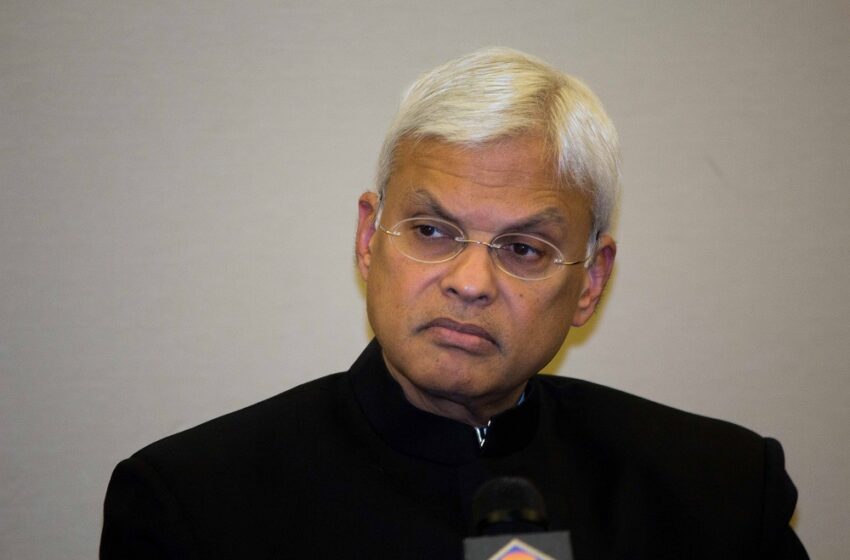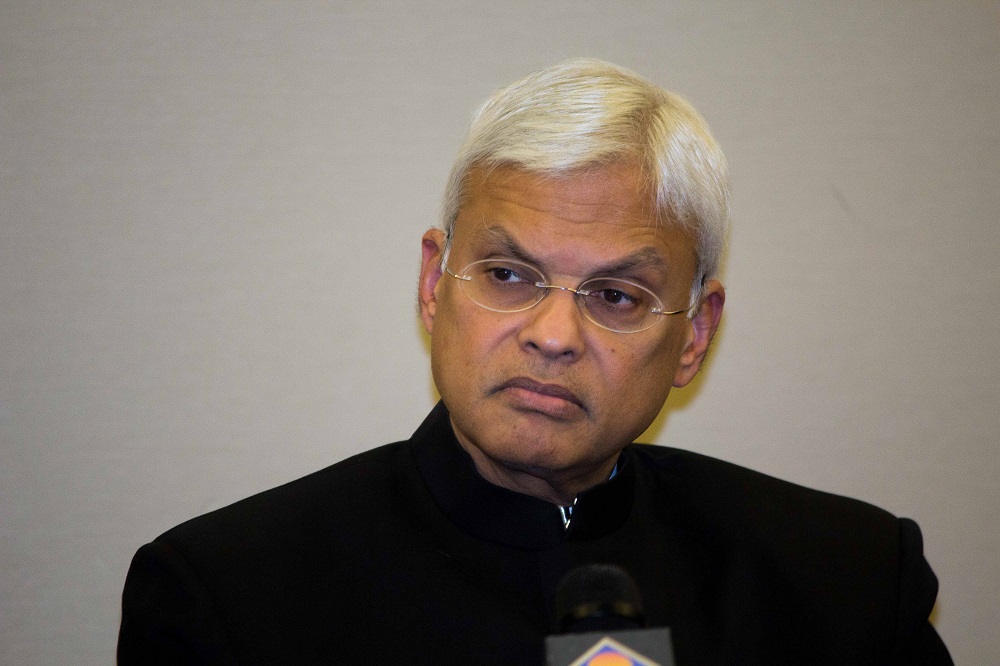US-India ties can be a model for US to relate to other partners that are not allies: Ashley Tellis

Ashley Tellis, a senior fellow at the Carnegie Endowment for International Peace, speaking at a press conference prior to the Indiaspora gala in Washington, DC, on January 3, 2017. Photo credit: The American Bazaar

Terming it the “unfinished business” in U.S.-India relations, prominent defense and security scholar Ashley J. Tellis called on the United States to “encourage India to become more and more comfortable with the idea of a coalition defense.”
Tellis, who holds the Tata Chair for Strategic Affairs at the Carnegie Endowment for International Peace in Washington, DC, was addressing a panel discussion on Capitol Hill, as part of the U.S.-India Summit hosted by Rep. Ro Khanna (D-CA), Co-Chair of the India Caucus.
The Indian American scholar, addressing the panel virtually, spoke about four unique and overarching aspects of the bilateral relationship. Even though the United States and India have made spectacular advances in security cooperation in the past two decades, the two countries cannot rest on laurels, he said.
READ: America-first strategy of Trump could damage US-India ties, warns Ashley Tellis (January 19, 2017)
“We still have great work to do,” Tellis said, cautioning against viewing the US-India defense cooperation simply “as something we do to elevate India’s capabilities — which of course we do because it is in our interest.” — In his opinion, the United States must “make India more and more comfortable in terms of being able to contribute as well to coalition events, especially in contingencies where the United States is going to need the help from its allies.”
Tellis, one of the key US negotiators of the 2008 civil nuclear agreement with India, said the United States should “pursue this objective” because of the same reason “that brought up the two countries together, which is shared interests.”
“We do have a clear vision that we do not want an Asia that is dominated exclusively by China that sucks the oxygen out of the freedom and liberties of other partners in that part of the world,” he said. “And precisely because we value that, I think, we need to look for ways in which India can increase the contributions it makes, not just simply in the areas of low politics, where its contributions have been very impressive, but I would say just as important in the areas of high politics because, at the end of the day, that is truly what distinguishes the best relations the United States has.”
Unique relationship
At the outset, Tellis described the bilateral relations as “a geopolitical project” that has very few parallels “because we are bringing together two countries, one which zealously cares about protecting its primacy, and the other which zealously cares about protecting its independence, in a partnership to build a new regional security architecture in Asia.”
He said that “we have gotten so used to the success of the U.S.-India partnership in the last two decades that we often overlook the fact about how unique it is,” and that the “uniqueness of this exercise really needs to be appreciated.”
According to Tellis, the US-India ties “could become a model for the way the United States relates to many other partners around the world who are not its allies, but who share critical convictions about a certain desirable global order.”
READ: US-India relations to expand beyond trade, says Admiral Harry Harris (March 16, 2018)
In dealing with India, Tellis said, the United States is “engaged with a partner, which is very different from ourselves.” The “fact that we have been able to pull off the successes” really is a testimony to the enormous efforts that have been made on both sides by governments of different stripes, across the aisle, both in the executive branch and Congress in the United States, and in parliament and in the in the Prime Minister’s Office, in India,” he added.
Calling the bilateral ties “a continual work in progress,” he said, “We’ll never be able to sort of throw up our hands and say, ‘You know, we’ve done the job’ because of the fact that even though we have convergent interests — and we have convergent interests today most strongly with respect to the Indo-Pacific, and, in particular, China — there are also going to be sufficient differences in the way that we look at the world.”
Tellis said the two countries have to manage those differences even as they deepen the defense partnership. Citing the differences Washington and New Delhi have over Ukraine, he said that “our divergences on Ukraine” for example, … has not been the first divergence and certainly won’t be the last.”
He credited some of the attendees, among them Biden administration officials, congressional staffers, analysts from various Washington think tanks and prominent Indian Americans for helping to navigate through those differences “and still keep the security partnership on the rails.”
Asymmetrical relationship
According to Tellis, “for the foreseeable future,” the US-India security relationship “is going to be an asymmetrical relationship.” The reason: “[You] are pitting together the world’s strongest power, the United States, and a country like India, which is still a developing country by many measures,” he said. “And that has a very … practical impact, and the practical impact is that India will simply not be able to respond in full reciprocity, in the measure that we Americans might find on every issue on which we transact. And we have to be conscious of this reality, because if we expect India to respond in full reciprocity, then I think we are setting ourselves up for failure.”
The scholar said, while India should be encouraged to do “more to the degree that it can in many areas,” one needs to just recognize that this could be an asymmetrical relationship for a long time to come.
READ: Indian Americans should strengthen US-India ties: Ro Khanna (April 26, 2023)
Tellis pointed out that the United States and India have strong convergence on geopolitics in Asia. “The United States and India see the future of the Indo-Pacific in terms that are strikingly parallel,” he said. “But we do have important differences with respect to the future of the global world order. And again, I want to emphasize this because it is something that is going to pop up every now and then, in disconcerting ways. And unless we are alert to these differences and we are willing to make the investments in managing them, the efforts that we’ve made in the past… could occasionally be threatened or come to a miss.”
READ: Center for American Progress outlines ideas to strengthen US-India relations (January 15, 2018)
He said that “a constant dialogue of the kind that we’ve been having at multiple levels, at the uniform level, at the level of civilian policymakers and the bureaucratic level, [and] at the level of civil society, is fundamentally important because we’re not going to change our views on what is desirable both over there, is but we can certainly work to manage you know the disagreements that we have.”
Other panelists were Deputy Assistant Secretary in the Bureau of South and Central Asian Affairs Nancy Jackson; Eileen H. Laubacher, a special assistant to the assistant to the president for national security affairs at the National Security Council; and Director for South Asia Affairs at the Department of Defense Siddharth Iyer. The panel was moderated by Tanvi Madan, a senior fellow at the Brookings Institution.
